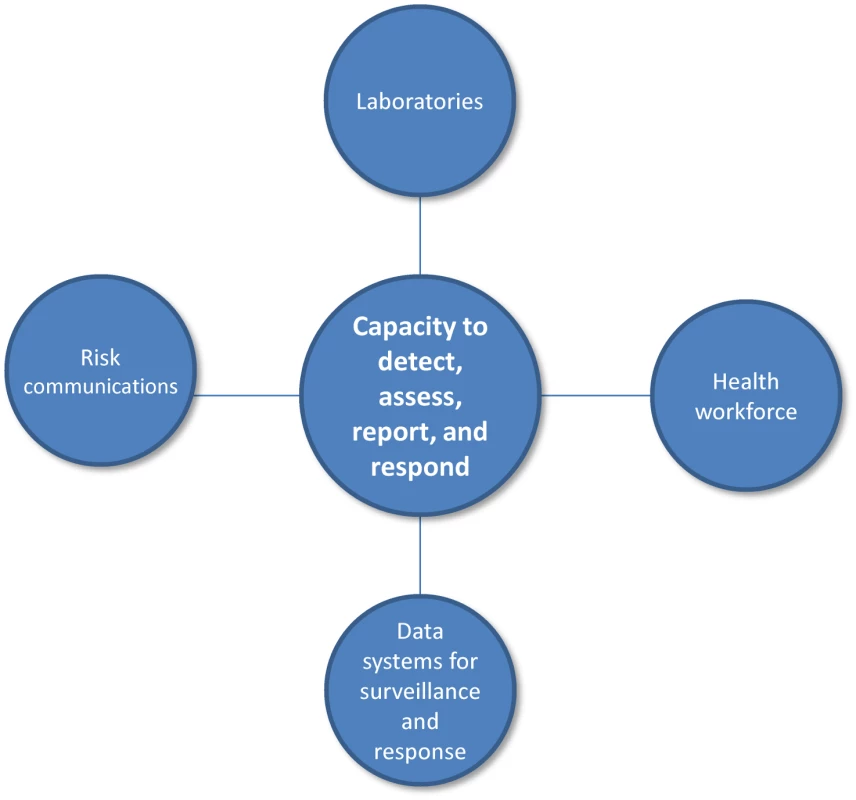-
Články
Top novinky
Reklama- Vzdělávání
- Časopisy
Top články
Nové číslo
- Témata
Top novinky
Reklama- Videa
- Podcasty
Nové podcasty
Reklama- Kariéra
Doporučené pozice
Reklama- Praxe
Top novinky
ReklamaToward a Common Secure Future: Four Global Commissions in the Wake of Ebola
Lawrence Gostin and colleagues offer a set of priorities for global health preparedness and response for future infectious disease threats.
Published in the journal: . PLoS Med 13(5): e32767. doi:10.1371/journal.pmed.1002042
Category: Policy Forum
doi: https://doi.org/10.1371/journal.pmed.1002042Summary
Lawrence Gostin and colleagues offer a set of priorities for global health preparedness and response for future infectious disease threats.
Summary Points
Four global commissions reviewing the recent Ebola virus disease epidemic response consistently recommended strengthening national health systems, consolidating and strengthening World Health Organization (WHO) emergency and outbreak response activities, and enhancing research and development.
System-wide accountability is vital to effectively prevent, detect, and respond to future global health emergencies.
Global leaders (e.g., United Nations, World Health Assembly, G7, and G20) should maintain continuous oversight of global health preparedness, and ensure effective implementation of the Ebola commissions’ key recommendations, including sustainable and scalable financing.
The world is becoming increasingly vulnerable to pandemics resulting from globalization, urbanization, intense human/animal interchange, and climate change. A series of global health crises have emerged since 2000, ranging from Severe Acute Respiratory Syndrome (SARS) and its phylogenetic cousin Middle East Respiratory Syndrome (MERS), to pandemic Influenza A (H1N1), Ebola, and the ongoing Zika virus epidemic. The Ebola epidemic gave rise to four global commissions proposing a bold new agenda for global health preparedness and response for future infectious disease threats [1–7].
The four commissions, listed in chronological order are: 1) the World Health Organization (WHO) Ebola Interim Assessment Panel (WHO Interim Assessment); 2) the Harvard University and the London School of Hygiene & Tropical Medicine’s Independent Panel on the Global Response to Ebola (Harvard/LSHTM); 3) the Commission on a Global Health Risk Framework for the Future (CGHRF) convened by the US National Academy of Medicine; and 4) the United Nations High-Level Panel on the Global Response to Health Crises (UN Panel). In response to critiques of WHO’s performance during the Ebola crisis, the World Health Assembly (WHA) approved an Advisory Group on Reform of WHO’s Work in Outbreaks and Emergencies, which reported in January 2016. The WHA also approved a Review Committee on the International Health Regulations (2005) (IHR), due to report in May [8].
The commissions were established to critically evaluate the national and global response to Ebola and to enhance preparedness to prevent, detect, and respond to future infectious disease threats. Each commission had its own membership and funding described in S1 Table, but had similar mandates to improve global health security. Given the major threat posed by infectious diseases, these panel reports should drive the agendas of the WHA and the G7 Summit in 2016, and global leaders should then maintain heightened oversight of global health preparedness going forward.
Pandemics pose a significant risk to security, economic stability, and development. The CGHRF estimated annualized expected losses from pandemics at $60 billion per year—$6 trillion in the 21st century—yet the global community has significantly underestimated and under-invested in pandemic threats. CGHRF recommended an annual incremental investment of $4.5 billion—65 cents per person—to strengthen global preparedness. This modest investment would provide a major security dividend.
This article focuses on three major reform dimensions—national health systems, global governance, and research and development—and offers a set of priorities drawing on the findings of all four commissions. S1 and S2 Tables compare the four commissions’ reports along these dimensions. To make the world safer, we need robust health systems; an empowered WHO, with strengthened response capacities; a well-funded and planned research and development strategy; and system-wide accountability.
National Health Systems
Robust and sustainable health systems are an indispensable prerequisite for health security. The IHR—the governing framework for managing infectious disease outbreaks—requires 196 States Parties to develop and maintain core health system capacities to detect, assess, report, and respond to potential public health emergencies of international concern (PHEIC) [9]. Core capacities include a health workforce, laboratories, data systems, and risk communication to identify and contain threats before they cross national borders (Fig 1). The initial target date for establishing these capacities was June 2012 [10].
WHO has traditionally measured national health capacities by allowing states to conduct annual self-assessments. Most states, however, missed the initial 2012 reporting requirement for meeting IHR core capacities and, in 2014, WHO extended the deadline to 2016 for all 81 states that requested extensions. Of the 193 states required to report, only 64 states reported meeting core capacities, representing a compliance rate of just over 30%, while 48 failed to even respond [10]. This low level of compliance for meeting minimum core capacity standards may be an overestimate because self-assessments are unreliable without independent validation.
Table 1 highlights the commissions’ recommendations to develop and assess core capacities. The WHO took an important step in February 2016, developing a Joint External Evaluation Tool to evaluate IHR capacities every 5 years, with national and international subject experts reviewing self-reported data, followed by a country visit and in-depth discussions. Each country’s assessment will be made public, with a color-coding scheme to delineate implementation levels for each capacity [11]. Until governments achieve a high degree of compliance with IHR obligations, however, WHO should plan more frequent external assessments, rather than waiting 5 years between assessments. Participation of stakeholders in the community should also be a critical component of assessments.
Tab. 1. Recommendations from the Four Global Commissions Concerning National Health Systems—Core Capacity Compliance. 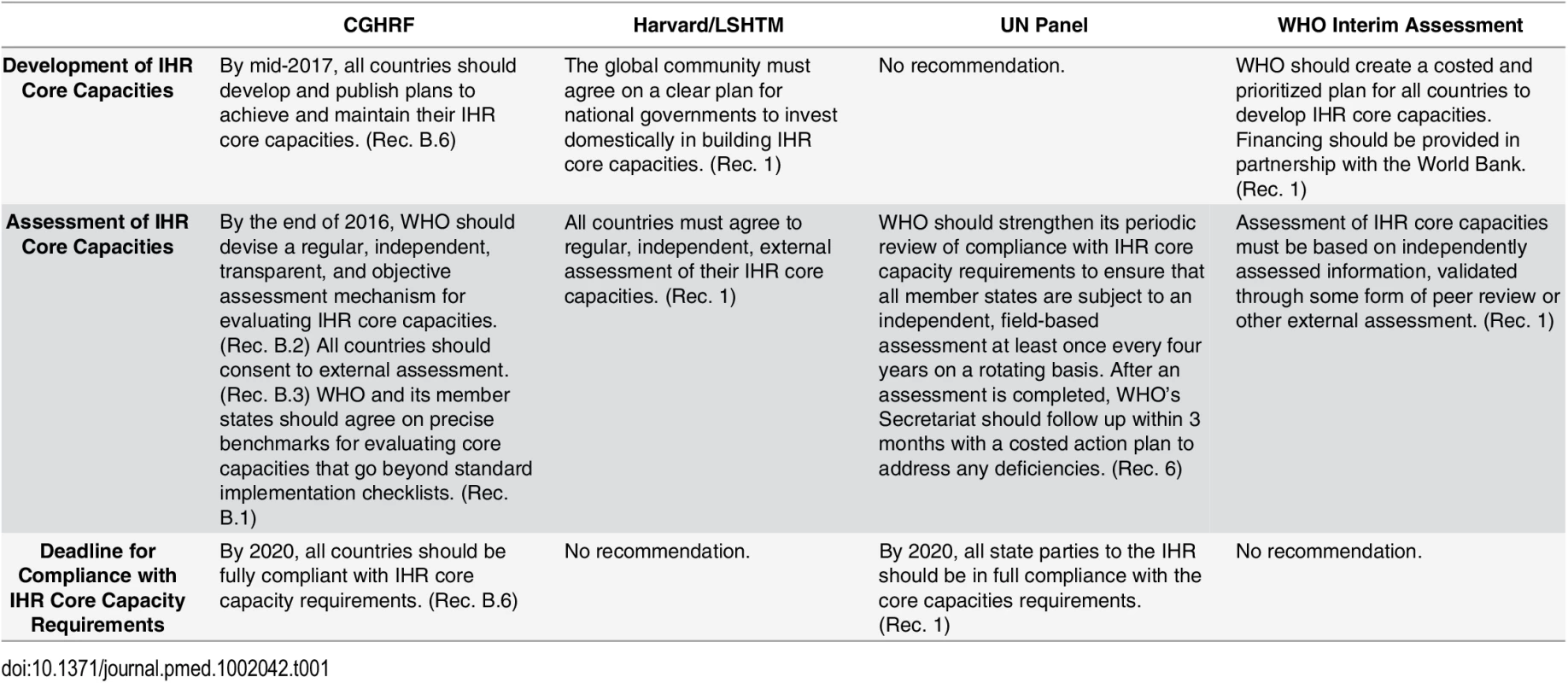
A major weakness of WHO’s new mechanism for monitoring the core capacities of states is that it is voluntary, reflecting state sovereignty concerns. Ensuring compliance with IHR obligations, even with better reporting, requires creative incentives, technical and financial support, and transparency. Table 2 highlights the commissions’ recommendations on financing and incentives towards ensuring countries report their core capacities and meet their minimum IHR obligations. The International Monetary Fund (IMF) could encourage countries to participate in ongoing evaluations by incorporating pandemic preparedness into its evaluation of macroeconomic stability [4]. IMF assessments offer a powerful inducement given their influence over countries’ access to capital. Similarly, the World Bank’s Pandemic Emergency Facility—along with regional development banks—could condition disbursements based on governments meeting IHR obligations.
Tab. 2. Recommendations from the Four Global Commissions Concerning National Health Systems—Core Capacity Financing and Incentives. 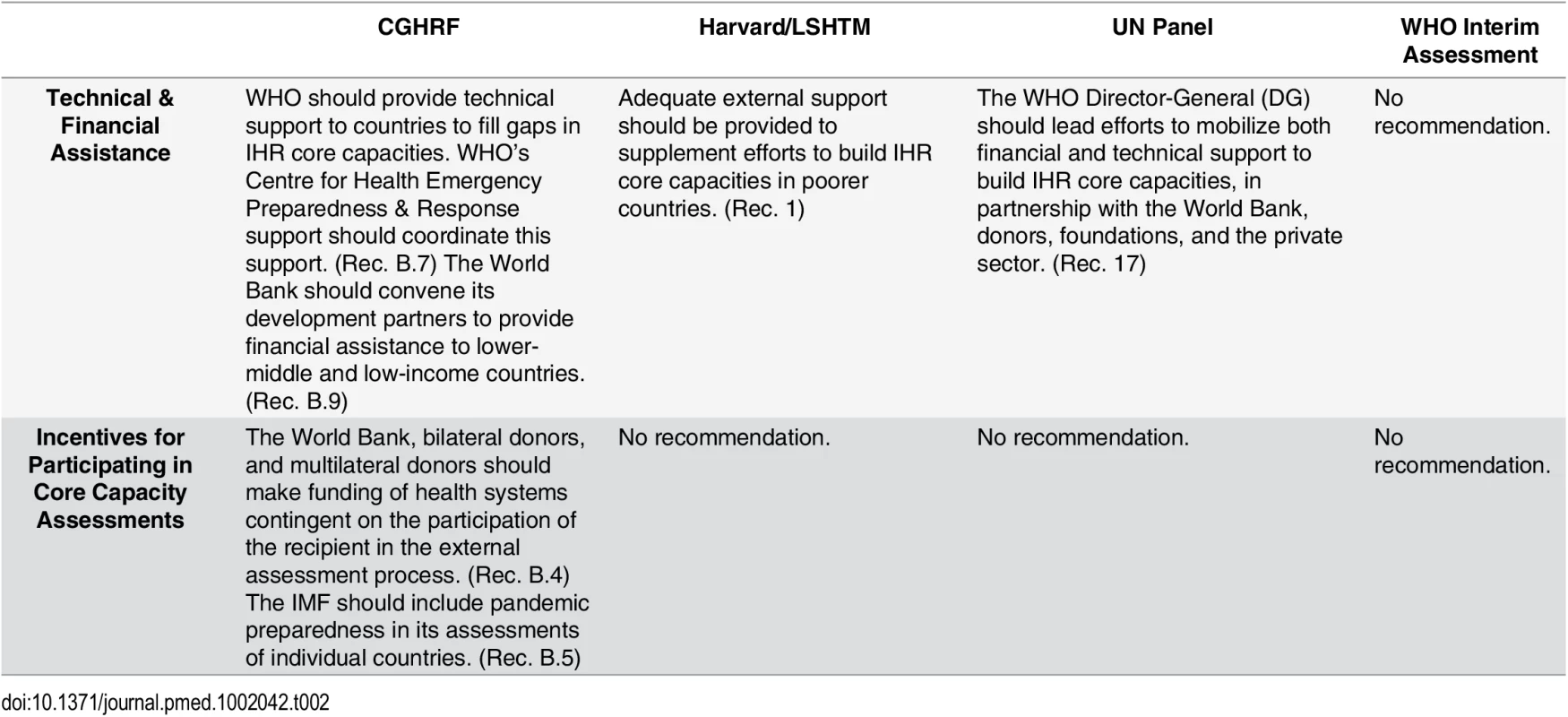
Political leaders are more likely to cooperate if they view external evaluations as a pathway to funding and technical support. Consequently, WHO should not simply give countries a pass/fail grade; rather, it should constructively partner with governments. Core capacity financing, however, requires the international community to close an investment gap of $3.4 billion per year [4]. WHO and the World Bank should develop a financial plan, with targets for national and international contributions. Additional financing mechanisms could be modeled on the Global Fund, with the World Bank and WHO hosting periodic donor investment and replenishment conferences.
The Global Health Security Agenda (GHSA), a partnership initiated by the United States encompassing nearly 50 countries, which was set up to prevent, detect, and respond to future infectious disease outbreaks, could offer a model for strengthening health systems [12]. GHSA, with >$1 billion in funding, has developed “Action Packages,” where priority technical areas are identified, with each encompassing a target and action items, along with baseline assessment, planning, and monitoring activities, and capabilities evaluated through a peer assessment process [13]. GHSA, however, formally stands outside the IHR framework, thus lacking the international legitimacy of a WHO-led process.
The minimum core capacities set out by the IHR on their own are insufficient to respond to public health threats and emergencies, however, as highlighted by the commissions’ recommendations in Table 3. Effective primary care and public health systems that underpin inclusive, high-quality universal health coverage (UHC) are also required to manage outbreaks and meet a broad range of health needs to ensure the right to health. Fast-spreading novel infections are diverse, demanding resilient health systems. As outbreaks stretch existing resources, resilient systems that are designed to ensure surge capacity in health emergencies are needed.
Tab. 3. Recommendations from the Four Global Commissions Concerning National Health Systems—Key Components. 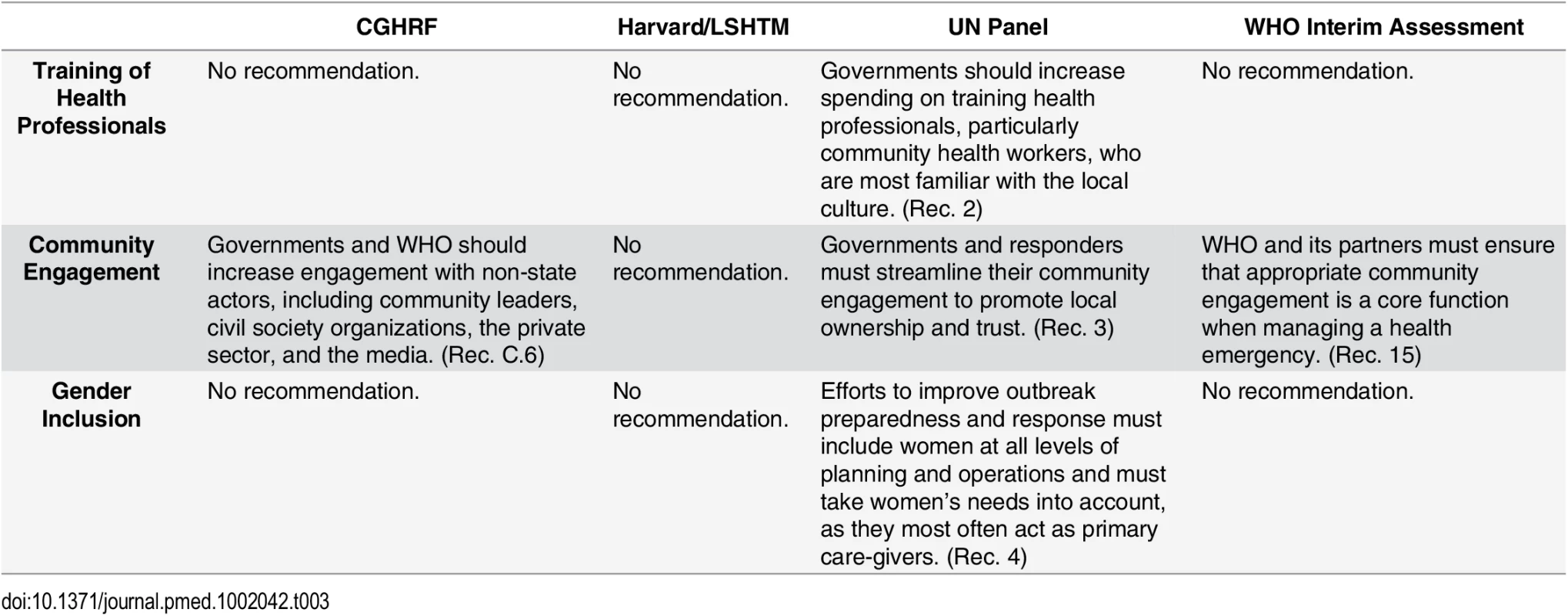
The UN Sustainable Development Goals (SDGs) expressly encompass infectious disease outbreaks and set a target for UHC by 2030 [14]. Many of the commissions’ recommendations fall within the SDGs’ framework as described in S2 Table. The SDGs, in supporting universal health systems, stress health equity, which is also vital because outbreaks often emerge in marginalized communities and then rapidly spread.
Achieving resilient health systems is a shared national and global responsibility. By 2017, every government should develop and publish concrete plans to achieve IHR core capacities by 2020. By the end of the following decade, all nations should achieve the SDG target of health coverage for all.
Global Governance for Health
The commissions’ reports reflecting on the Ebola epidemic echoed a crucial point made by the IHR Review Committee on the response to the H1N1 pandemic in its 2011 report—“the world is ill-prepared for a severe pandemic or for any similarly global, sustained and threatening public health emergency” [15]. At an international level, the commissions’ reports focused on reforms for WHO and the UN System, but also discussed the role of the World Bank and World Trade Organization (WTO) (Table 4).
Tab. 4. Recommendations from the Four Global Commissions Concerning Global Governance—International Coordination. 
World Health Organization
If national health systems are the foundation for global health security, WHO is at the apex [16]. Yet WHO faces a crisis of confidence, with major critiques of its performance during Ebola. The Organization had previously cut nearly two-thirds of its emergency response unit; delayed four-and-a-half months before declaring a PHEIC; and lacked the governance needed to coordinate multiple stakeholders, including its regional and country offices [17]. As featured in the recommendations in Table 5, the commissions called for emergency preparedness and response to become “a core part of WHO’s mandate, positioning itself as an operational organization” [8].
Tab. 5. Recommendations from the Four Global Commissions Concerning Global Governance—WHO Emergency Operations and Response Reform. 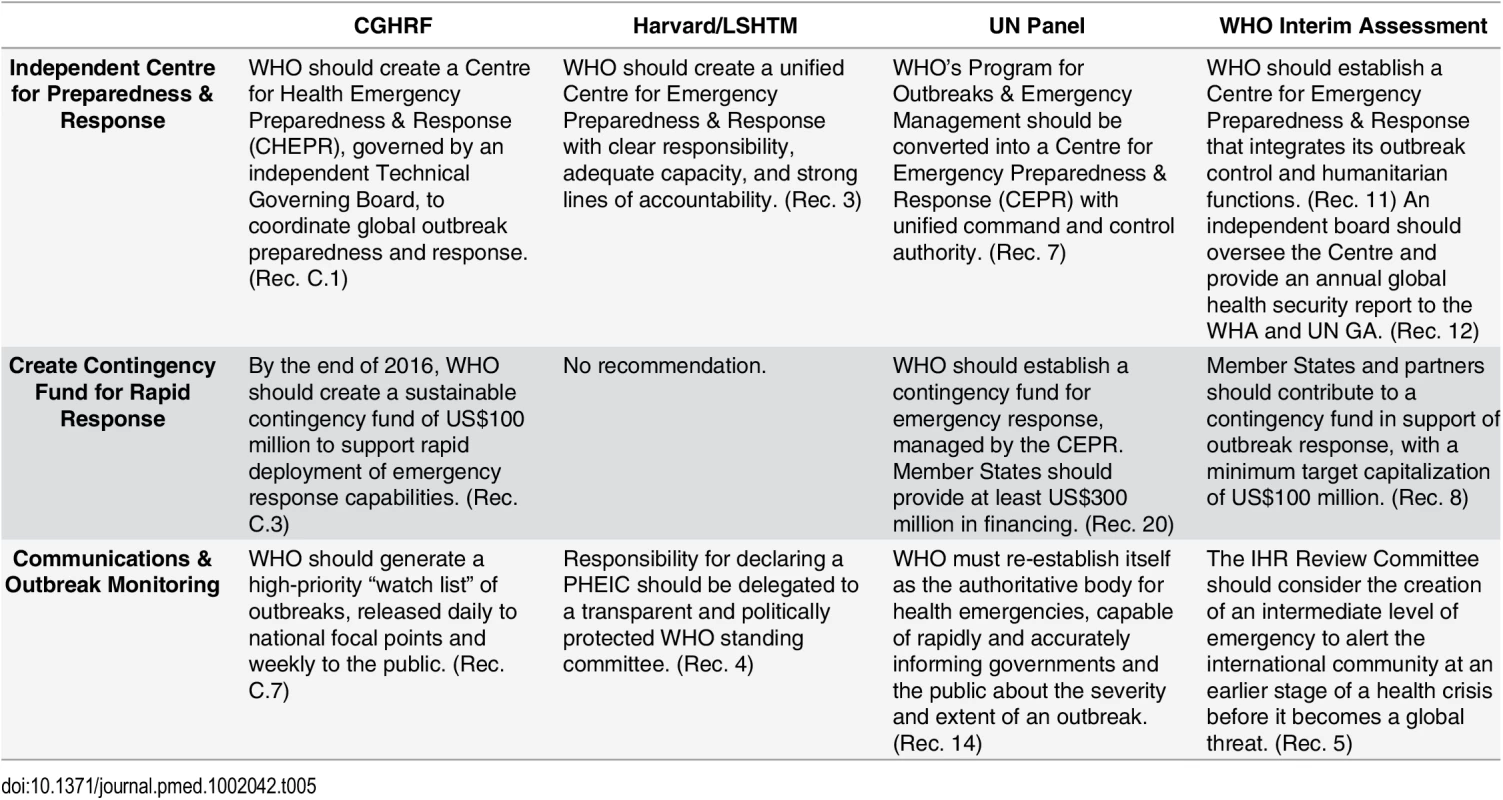
The commissions also unanimously recommended that WHO create a Centre for Emergency Preparedness and Response (CEPR), integrating and strengthening all its preparedness, response, and humanitarian activities. The Centre would have a clear mandate, separate funding streams, and strong lines of accountability. An Executive Director (at the Deputy Director-General level) would lead the Centre, reporting to an independent oversight body. CGHRF recommended a Technical Governing Board comprised of independent experts to hold the CEPR accountable.
Member States have resisted providing the funding needed for WHO to fulfill its global mandate, and most existing funding is earmarked. The absence of sustainable and scalable financing could diminish WHO’s capacity to manage future outbreaks. Table 6 highlights the commissions’ recommendations regarding WHO’s ongoing reforms. As WHO’s emergency operational capacities are upgraded, states must not cut funding for its other core activities, including noncommunicable diseases, injuries, and mental health—the Harvard/LSHTM panel recommended “its functions should be far more circumscribed” [3].
Tab. 6. Recommendations from the Four Global Commissions Concerning Global Governance—Ongoing WHO Reform. 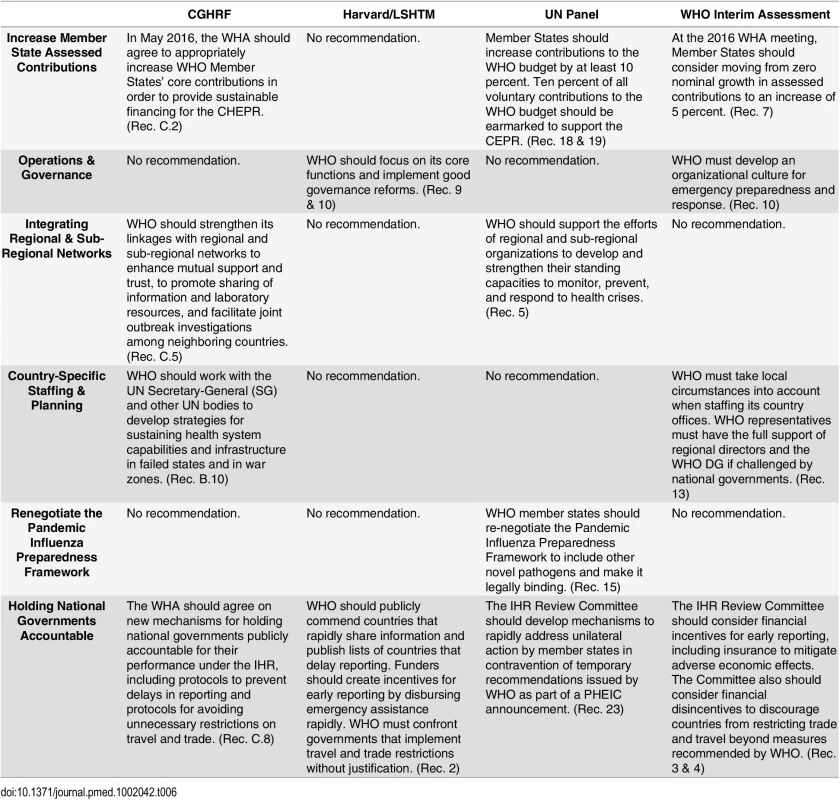
In March 2016, the Secretariat launched WHO’s Health Emergencies Programme to assure “cross-organizational standards and rapid decision-making in health emergency operations” [7]. The Programme’s development was influenced by the Advisory Group on Reform of WHO’s Work in Outbreaks and Emergencies, whose recommendations are highlighted in Table 7. Whether the Programme meets the panels’ standards for a quasi-independent Centre of high quality and accountability remains to be determined. Currently, the Programme has no sustained funding or independent governance. However, the Director-General is establishing an Independent Oversight and Advisory Committee to monitor and oversee the Programme’s performance.
Tab. 7. Recommendations of the WHO Advisory Group. 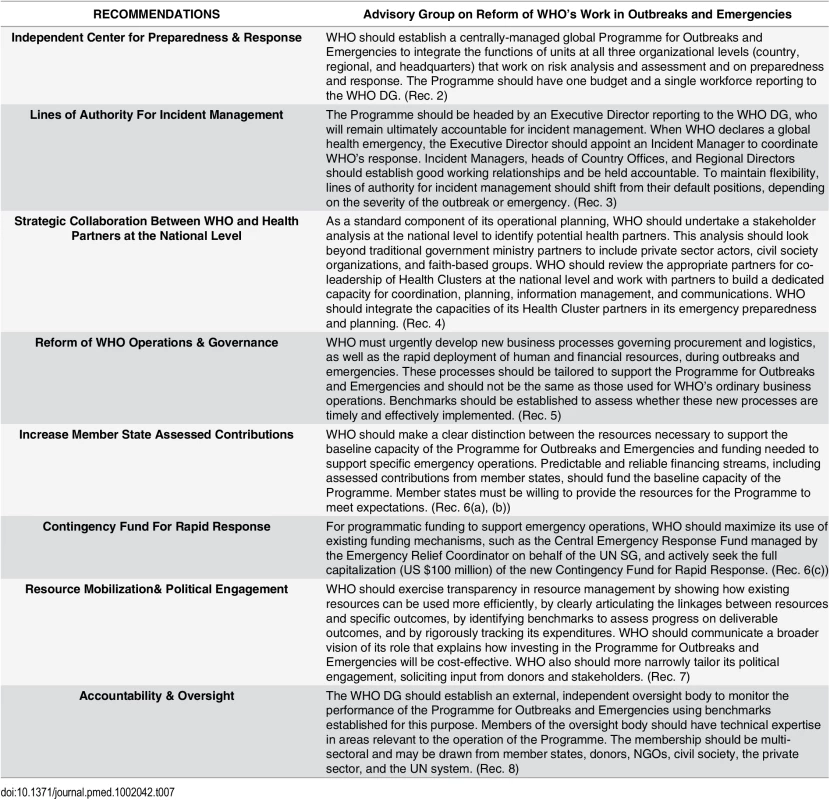
The United Nations System
When a health crisis escalates to a humanitarian disaster, even a well-resourced WHO will be unable to galvanize political will and coordinate a broader response, requiring operational control to shift to the United Nations. Table 8 highlights the commissions’ recommendations on the UN’s role and responsibilities during a health crisis. WHO should advise the UN Emergency Relief Coordinator to make this determination based on criteria for a Level 3 emergency (the highest level), including the epidemic’s scale, economic toll, and political destabilization [18]. The UN Inter-Agency Standing Committee, “the primary mechanism for inter-agency coordination of humanitarian assistance,” [19] would establish procedures for UN inter-agency coordination [6].
Tab. 8. Recommendations from the Four Global Commissions Concerning Global Governance—Ongoing UN Reform. 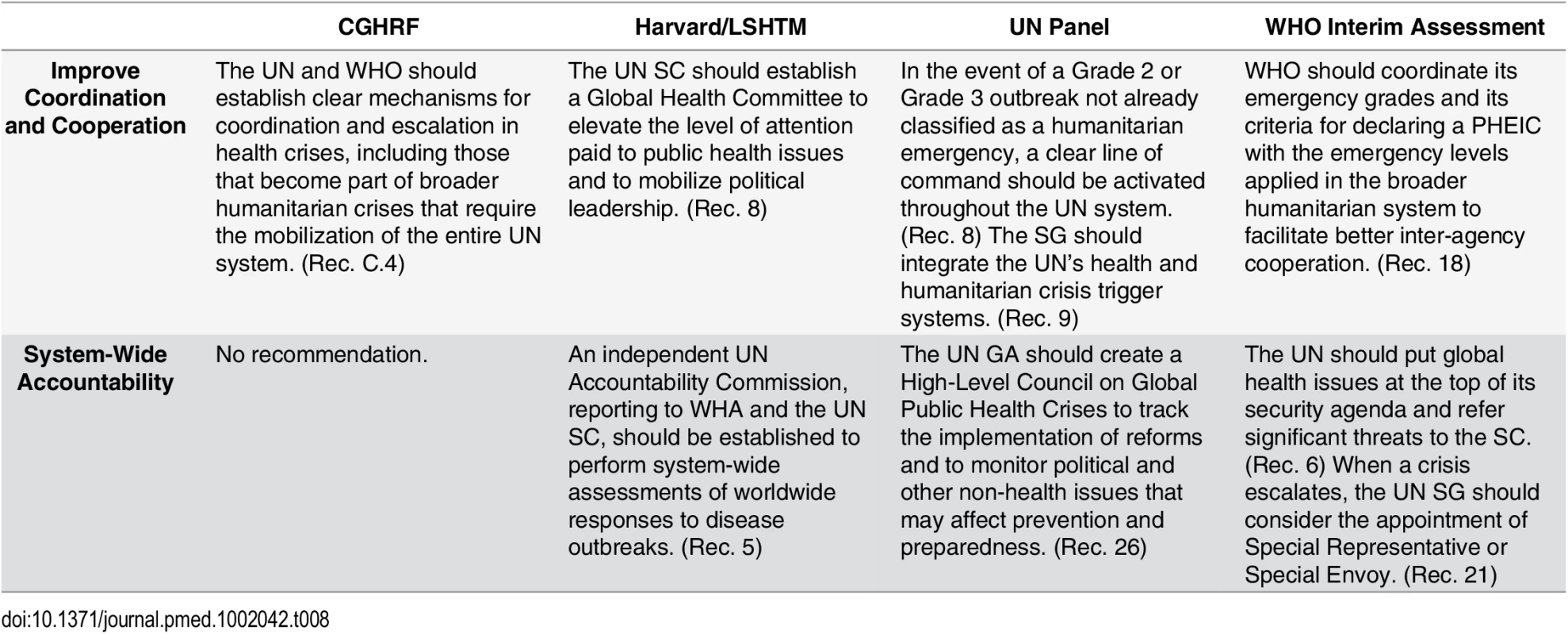
A UN Security Council resolution would elevate a crisis to the top tier of the global agenda. As binding international law, a Council resolution would be more effective in mobilizing resources, sustaining political will, and securing state compliance with WHO recommendations. The Secretary-General could also appoint a special envoy or establish a mission to implement Security Council directives [6].
It is also important to ensure ongoing UN engagement during inter-crisis periods. The UN High-Level Panel recommended the General Assembly form a Council on Global Health Crises, while the Harvard/LSHTM panel proposed a standing Global Health Committee within the Security Council. Creating a standing presence in a UN organ and, where necessary, declaring a Level 3 Emergency would raise the public and political profile of global health security in ways WHO has been unable to achieve.
Research and Development (R&D)
The Ebola and Zika epidemics revealed systemic deficiencies in R&D for diagnostic tests, vaccines, and therapies. The paucity of medical technologies stem primarily from low commercial priority, limited funding, and practical challenges of conducting human trials for episodic infections. Yet medical countermeasures are vital to contain outbreaks and minimize their impact.
As highlighted by the recommendations in Table 9, WHO has a central role in establishing the normative framework for R&D including priority setting, accelerating trial design and administration, regulatory pathways, and equitable access. The Organization spearheaded an international effort for an Ebola vaccine. More recently, WHO identified eight pathogens as research priorities, but at a high level of generality [20]. In March 2016, WHO published more granular priorities for Zika, including vector control [21]. Vaccine platform technologies may be able to accelerate the development of a vaccine for the Zika virus, as well as other pathogens. Yet, even with expedited vaccine development, inadequate access to existing vaccines still persists. For example, Yellow Fever vaccine stockpiles during a recent outbreak have been exhausted. CGHRF recommended an independent Pandemic Product Development Committee to mobilize resources, coordinate public/private actors, and create a strategic R&D plan.
Tab. 9. Recommendations from the Four Global Commissions Concerning Research and Development—R&D Acceleration. 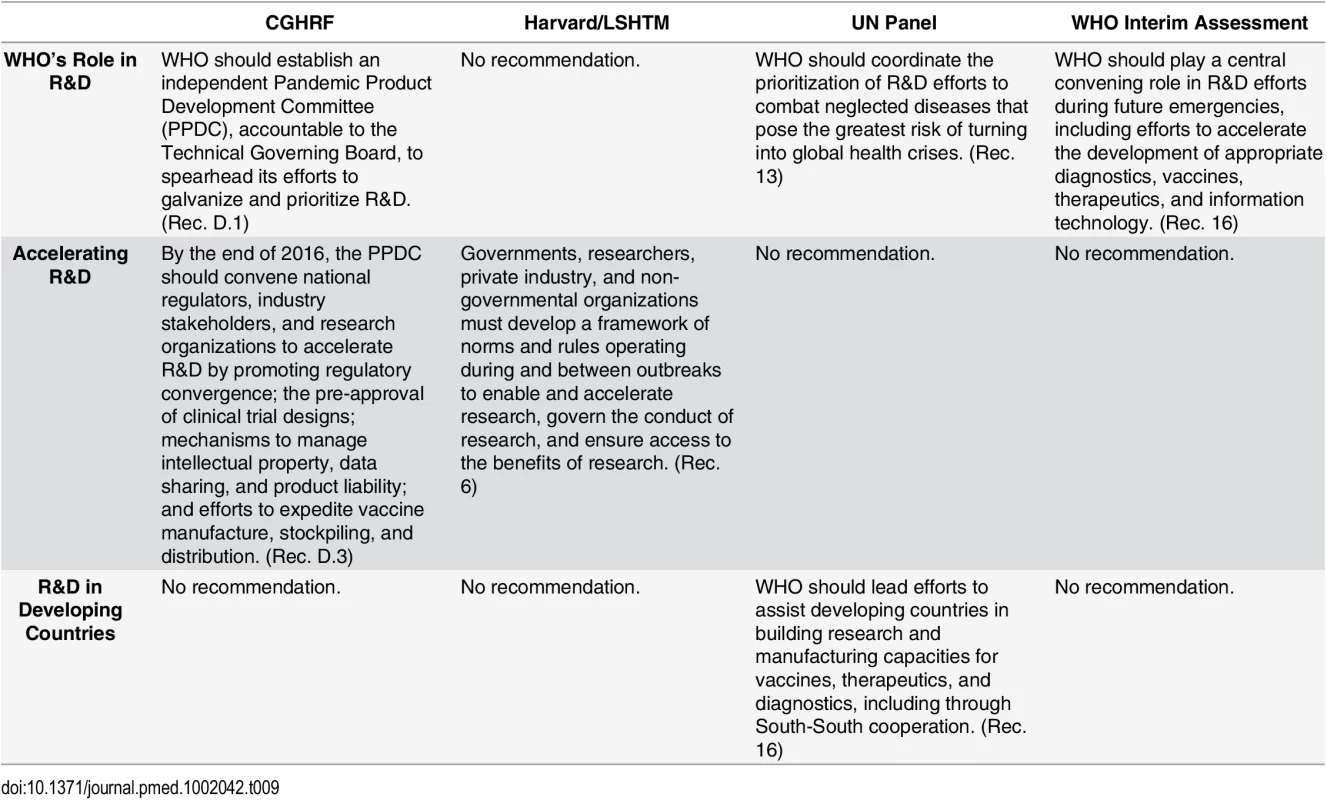
CGHRF, joined by other panels, urged $1 billion incremental funding per year from combined governmental and private sources to jumpstart research innovations (Table 10). Beyond medical technologies, targeted investments would facilitate manufacturing capacity in lower-income countries, improve personal protective equipment effectiveness, enhance information systems, and integrate the study of zoonotic pathogens into ongoing research. The commissions placed a premium on scientifically and ethically rigorous trial designs and research participants’ rights.
Tab. 10. Recommendations from the Four Global Commissions Concerning Research and Development—Financing. 
Research requires sharing biological materials, but governments sometimes delay. Concerned about affordable access to the fruits of research, states have claimed sovereignty over viruses under the 2010 Nagoya Protocol to the Convention on Biological Diversity. The Pandemic Influenza Preparedness (PIP) Framework—negotiated by WHO—requires states to share biological materials and pharmaceutical companies to provide reciprocal benefits, such as a share of the resulting drugs or vaccines. The PIP Framework, however, applies only to pandemic influenza and not to other novel pathogens. The UN High-Level Panel recommended that WHO re-negotiate the PIP Framework to expand its scope and make it legally binding.
System-wide Accountability
Implementing the commissions’ bold agenda requires system-wide accountability. Figs 2 and 3 demonstrate the commissions’ suggested accountability frameworks during both inter-crisis and global health emergency periods. All frameworks would require continual communication and inter-agency collaboration, as well as partnerships with multiple stakeholders. The UN High-Level Panel called for a Summit on Global Public Health Crises in 2018 to assess implementation. The Harvard/LSHTM Panel went further, proposing a UN Accountability Commission to oversee the full range of actors [3].
Fig. 2. Accountability frameworks proposed by the four commissions during inter-emergencies period. 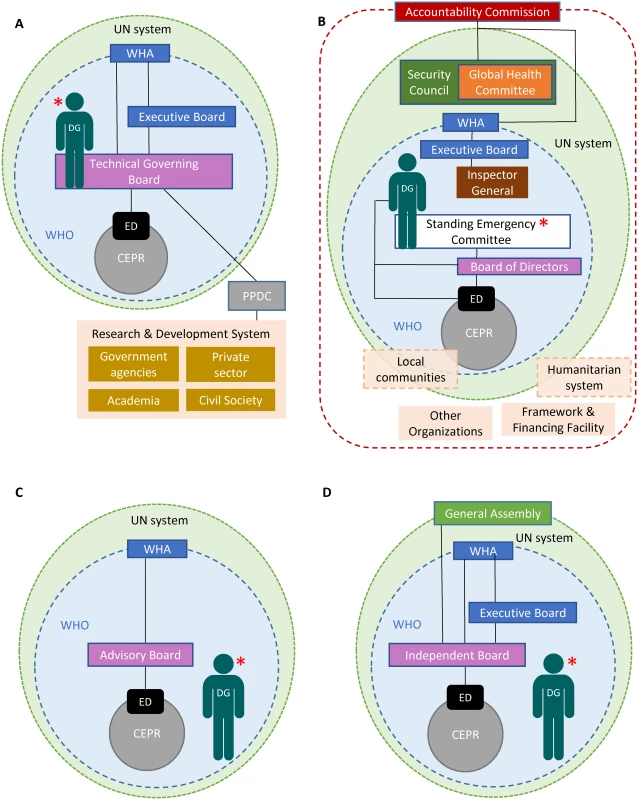
(A) Commission on a Global Health Risk Framework for the Future, (B) Harvard-London School of Hygiene & Tropical Medicine’s Independent Panel on the Global Response to Ebola, (C) United Nations High-Level Panel on the Global Response to Health Crises, (D) World Health Organization Ebola Interim Assessment Panel. * denotes individual/body with responsibility for declaring a Public Health Emergency of International Concern (PHEIC). CEPR = Centre for Emergency Preparedness and Response, DG = Director-General, ED = Executive Director, PPDC = Pandemic Product Development Committee, SG = Secretary-General, UN = United Nations, WHA = World Health Assembly, WHO = World Health Organization. Fig. 3. Changes to the accountability frameworks during a PHEIC that has turned into a humanitarian crisis. 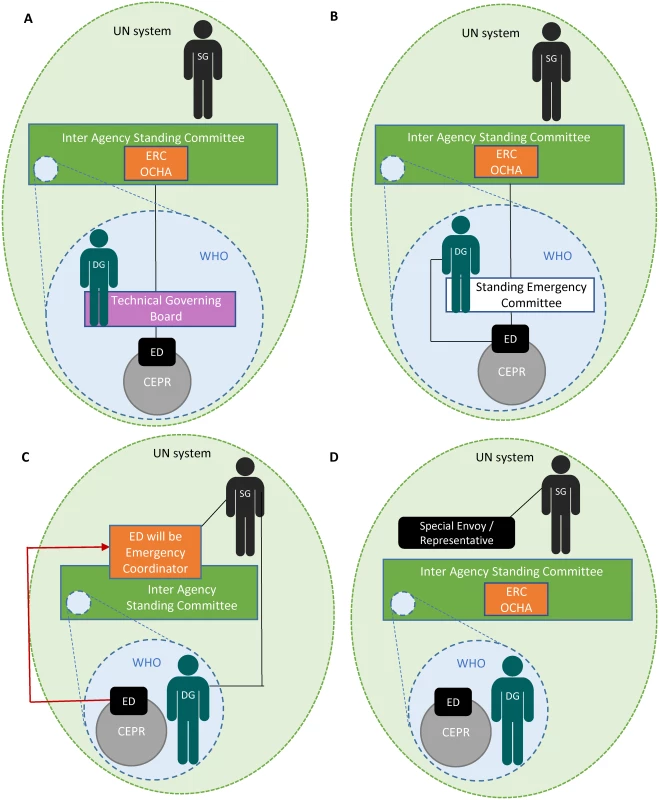
(A) Commission on a Global Health Risk Framework for the Future, (B) Harvard-London School of Hygiene & Tropical Medicine’s Independent Panel on the Global Response to Ebola, (C) United Nations High-Level Panel on the Global Response to Health Crises, (D) World Health Organization Ebola Interim Assessment Panel. CEPR = Centre for Emergency Preparedness and Response, DG = Director-General, ED = Executive Director, ERC = Emergency Response Coordinator, OCHA = Office for the Coordination of Humanitarian Affairs, SG = Secretary-General, UN = United Nations, WHO = World Health Organization. The commissions proposed greater WHO accountability, including independent oversight of a future CEPR. To conform with WHO’s Constitution, accountability would reside in the Executive Board to which the new Centre would report, with full transparency. The Independent Oversight and Advisory Committee of the newly established WHO Health Emergencies Programme will report to the Executive Board, but ultimate authority rests with the Director-General for WHO’s work in health emergencies.
Holding sovereign governments accountable poses the greatest challenge. States have sometimes failed to promptly report potential PHEICs or share crucial health information. Many states have erected unnecessary travel and trade restrictions or infringed on human rights. The commissions unanimously recommended that the Director-General publicly name governments that fail to act as responsible global citizens [22]. Beyond transparency, it may be possible to coax states’ compliance with their IHR obligations through skilled diplomacy and incentives.
Political Leadership
The commissions’ proposals are ambitious, with action needed everywhere from civil society and research laboratories to Geneva and national capitals. Political attention to global health security can no longer be episodic, limited to when an epidemic strikes. Political leadership must be sustained by standing agendas on health security at the WHA, G7, G20, and Security Council, with the United Nations overseeing crucial reforms. The commissions have defined a path forward. It would be a reckless disregard for human life and security to resist vital reforms.
Supporting Information
Zdroje
1. WHO. Report of the Ebola interim assessment panel. Geneva: World Health Organization; 2015. Available: http://who.int/csr/resources/publications/ebola/report-by-panel.pdf. Accessed 16 March 2016.
2. WHO. 2014 Ebola virus disease outbreak and follow-up to the special session of the Executive Board to Ebola. Geneva: World Health Organization; 2015. Available: http://apps.who.int/gb/ebwha/pdf_files/WHA68/A68_ACONF5-en.pdf. Accessed 16 March 2016.
3. Moon S, Sridhar D, Pate MA, Jha AK, Clinton C, Delaunay S, et al. Will Ebola change the game? Ten essential reforms before the next pandemic. The report of the Harvard-LSHTM Independent Panel on the Global Response to Ebola. Lancet. 2015;386 : 2204–21. doi: 10.1016/S0140-6736(15)00946-0 26615326
4. Commission on a Global Health Risk Framework for the Future, National Academy of Medicine, Secretariat. The neglected dimension of global security: a framework to counter infectious disease crises. Washington, D.C.: National Academies Press; 2016. Available: http://www.nap.edu/catalog/21891. Accessed 16 March 2016.
5. Secretary-General appoints high-level panel on global response to health crises. Available: http://www.un.org/press/en/2015/sga1558.doc.htm. Accessed 16 March 2016.
6. UN High-Level Panel on the Global Response to Health Crises. Protecting humanity from future health crises. New York: United Nations; 2016. Available: http://www.un.org/News/dh/infocus/HLP/2016-02-05_Final_Report_Global_Response_to_Health_Crises.pdf. Accessed 16 March 2016.
7. WHO. Advisory group on reform of WHO’s work in outbreaks and emergencies reform. Geneva: World Health Organization; July 2015. Available: http://www.who.int/about/who_reform/emergency-capacities/advisory-group/en/. Accessed 16 March 2016.
8. WHO Executive Board. 2014 Ebola virus disease outbreak and issues raised: follow-up to the special session of the Executive Board on the Ebola emergency (resolution EBSS3.R1) and the sixty-eighth World Health Assembly (decision WHA68(10)). EB138/55. Geneva: World Health Organization; 2016. Available: http://apps.who.int/gb/ebwha/pdf_files/EB138/B138_55-en.pdf. Accessed 15 March 2016.
9. WHO. International Health Regulations (2005). Second edition. Geneva: World Health Organization; 2008. Available: http://apps.who.int/iris/bitstream/10665/43883/1/9789241580410_eng.pdf. Accessed 16 March 2016.
10. WHO. WHO implementation of the International Health Regulations (2005): report of the review committee on second extensions for establishing national public health capacities on IHR implementation: report by the Director-General. Geneva: World Health Organization; 27 March 2015. Available: http://apps.who.int/gb/ebwha/pdf_files/WHA68/A68_22Add1-en.pdf. Accessed 16 March 2016.
11. WHO. IHR (2005): Monitoring and evaluation framework: joint external assessment tool: International Health Regulations (2005). Geneva: World Health Organization; February 2016. Available: http://apps.who.int/iris/bitstream/10665/204368/1/9789241510172_eng.pdf?ua=1. Accessed 16 March 2016.
12. Global Health Security Agenda. About the Global Health Security Agenda. Available: https://ghsagenda.org/about.html. Accessed 15 March 2016.
13. White House. Fact sheet: the Global Health Security Agenda. Washington, DC: White House; 28 July 2015. Available: https://www.whitehouse.gov/the-press-office/2015/07/28/fact-sheet-global-health-security-agenda. Accessed 15 March 2016.
14. United Nations General Assembly (2015). Transforming our world: the 2030 agenda for sustainable development. A/RES/70/1. New York: United Nations; 2015. Available: http://www.un.org/en/ga/search/view_doc.asp?symbol=A/RES/70/1. Accessed 14 December 2015.
15. WHO. Strengthening response to pandemics and other public-health emergencies: report of the Review Committee on the functioning of the International Health Regulations (2005) and on Pandemic Influenza (H1N1) 2009. Geneva: World Health Organization; 2011. Available: http://apps.who.int/iris/bitstream/10665/75235/1/9789241564335_eng.pdf?ua=1. Accessed 21 April 2016.
16. Gostin LO, Friedman EA. A retrospective and prospective analysis of the West African Ebola Virus Disease epidemic: robust national health systems at the foundation and an empowered WHO at the apex. Lancet. 2015;385 : 1902–1909. doi: 10.1016/S0140-6736(15)60644-4 25987158
17. World Health Assembly. Program budget 2016–2017: WHA68.1. Geneva: World Health Organization; 2015. Available: http://www.who.int/about/finances-accountability/funding/A68_R1_en.pdf. Accessed 15 March 2016.
18. Inter-Agency Standing Committee. Inter-agency standing committee transformation agenda reference document, humanitarian system-wide activation: definitions and procedures. New York: United Nations; 2012. Available: https://interagencystandingcommittee.org/system/files/legacy_files/2.%20System-Wide%20%28Level%203%29%20Activation%20%2820Apr12%29.pdf. Accessed: 16 March 2016.
19. Inter-Agency Standing Committee. Welcome to the IASC. Available: https://interagencystandingcommittee.org/iasc/. Accessed 16 March 2016.
20. WHO. WHO publishes list of top emerging diseases likely to cause major epidemics. Available: http://www.who.int/medicines/ebola-treatment/WHO-list-of-top-emerging-diseases/en/. Accessed 16 March 2016.
21. WHO. WHO and experts prioritize vaccines, diagnostics and innovative vector control tools for Zika R&D. Available: http://www.who.int/mediacentre/news/notes/2016/research-development-zika/en. Accessed 16 March 2016.
22. Fleck F. How SARS changed the world in less than six months. Bull World Health Organ. 2003; 81(8): 625–626. Available: http://www.who.int/bulletin/volumes/81/8/News0803.pdf. Accessed 16 March 2016. 14576896
Štítky
Interní lékařství
Článek vyšel v časopisePLOS Medicine
Nejčtenější tento týden
2016 Číslo 5- Berberin: přírodní hypolipidemikum se slibnými výsledky
- Léčba bolesti u seniorů
- Příznivý vliv Armolipidu Plus na hladinu cholesterolu a zánětlivé parametry u pacientů s chronickým subklinickým zánětem
- Jak postupovat při výběru betablokátoru − doporučení z kardiologické praxe
- Červená fermentovaná rýže účinně snižuje hladinu LDL cholesterolu jako vhodná alternativa ke statinové terapii
-
Všechny články tohoto čísla
- Epidemiology and Reporting Characteristics of Systematic Reviews of Biomedical Research: A Cross-Sectional Study
- Steroid-Based Therapy and Risk of Infectious Complications
- How Much Can the USA Reduce Health Care Costs by Reducing Smoking?
- Interpreting the Global Enteric Multicenter Study (GEMS) Findings on Sanitation, Hygiene, and Diarrhea
- Health Research and the World Humanitarian Summit—Not a Thousand Miles Apart
- A Public Health Paradox: The Women Most Vulnerable to Malaria Are the Least Protected
- Toward a Common Secure Future: Four Global Commissions in the Wake of Ebola
- The Clinical Challenge of Sepsis Identification and Monitoring
- All-Cause Mortality of Low Birthweight Infants in Infancy, Childhood, and Adolescence: Population Study of England and Wales
- Smoking Behavior and Healthcare Expenditure in the United States, 1992–2009: Panel Data Estimates
- Estimating the Risk of Chronic Pain: Development and Validation of a Prognostic Model (PICKUP) for Patients with Acute Low Back Pain
- Initiating Antiretroviral Therapy for HIV at a Patient’s First Clinic Visit: The RapIT Randomized Controlled Trial
- Prioritizing Surgical Care on National Health Agendas: A Qualitative Case Study of Papua New Guinea, Uganda, and Sierra Leone
- Effectiveness of and Financial Returns to Voluntary Medical Male Circumcision for HIV Prevention in South Africa: An Incremental Cost-Effectiveness Analysis
- Risk of Advanced Neoplasia in First-Degree Relatives with Colorectal Cancer: A Large Multicenter Cross-Sectional Study
- Common Infections in Patients Prescribed Systemic Glucocorticoids in Primary Care: A Population-Based Cohort Study
- Sanitation and Hygiene-Specific Risk Factors for Moderate-to-Severe Diarrhea in Young Children in the Global Enteric Multicenter Study, 2007–2011: Case-Control Study
- A Revolution in Treatment for Hepatitis C Infection: Mitigating the Budgetary Impact
- Nondisclosure of Financial Interest in Clinical Practice Guideline Development: An Intractable Problem?
- Financial Relationships between Organizations That Produce Clinical Practice Guidelines and the Biomedical Industry: A Cross-Sectional Study
- Prices, Costs, and Affordability of New Medicines for Hepatitis C in 30 Countries: An Economic Analysis
- PLOS Medicine
- Archiv čísel
- Aktuální číslo
- Informace o časopisu
Nejčtenější v tomto čísle- Estimating the Risk of Chronic Pain: Development and Validation of a Prognostic Model (PICKUP) for Patients with Acute Low Back Pain
- Prioritizing Surgical Care on National Health Agendas: A Qualitative Case Study of Papua New Guinea, Uganda, and Sierra Leone
- A Revolution in Treatment for Hepatitis C Infection: Mitigating the Budgetary Impact
- Toward a Common Secure Future: Four Global Commissions in the Wake of Ebola
Kurzy
Zvyšte si kvalifikaci online z pohodlí domova
Současné možnosti léčby obezity
nový kurzAutoři: MUDr. Martin Hrubý
Všechny kurzyPřihlášení#ADS_BOTTOM_SCRIPTS#Zapomenuté hesloZadejte e-mailovou adresu, se kterou jste vytvářel(a) účet, budou Vám na ni zaslány informace k nastavení nového hesla.
- Vzdělávání




